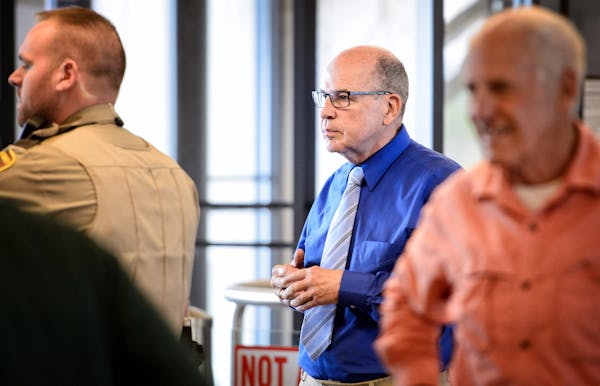Soon after a Dakota County jury acquitted Francis Hoefgen of criminal sexual misconduct with a former altar boy, St. Paul attorney Jeff Anderson released evidence that the jury did not hear — documents in which the former Catholic priest admitted to police that he had sexually assaulted a different teenage boy in 1984.
The latest documents add to more than 50 pages already available about Hoefgen, 64, a priest identified as credibly accused by St. John's Abbey in Collegeville, Minn., and whose trial was monitored by victims' advocates across the country.
Advocates, including Anderson, claim the acquittal amounts to a "travesty of justice." Legal experts say it underscores the difficulties of prosecuting older child abuse cases as Minnesota enters a new era of exposing clergy sexual offenders.
"These are extremely challenging prosecutions," said Marci Hamilton, a law professor at Yeshiva University in New York and a national expert on clergy abuse litigation. "Evidence can be strong about a pattern of abuse, but not about the incident in a particular case. There must be evidence about this crime, by this perpetrator and this victim, to put someone away."
Prior sexual misconduct can be admitted as evidence in the growing number of civil court cases filed in Minnesota courts, which now number 44. However, for the handful of criminal cases in play, it will be up to a judge to determine.
In Hoefgen's case, the judge determined no.
The number of priests charged with criminal sexual abuse each year is small, largely because of statutes of limitations on older crimes, prosecutors' reluctance to take the cases and a lack of corroborating evidence.
The difficulty of finding a priest guilty "beyond a reasonable doubt" was illustrated last month in Philadelphia. After two juries failed to reach a verdict in a case against a priest charged with sexually assaulting an altar boy in 1997, the district attorney's office announced that it would not retry the Rev. Andrew McCormick for a third time.
"Proving beyond a reasonable doubt that a crime occurred decades ago without significant corroborating physical evidence of the crime itself is always a difficult task," said Dakota County Attorney James Backstrom. "Without such corroborating evidence, the jury is often left to render its decision based primarily upon one person's word against that of another."
Backstrom's office had argued that the jury should have heard "all the evidence," including testimony from two other people who claimed they had been abused by Hoefgen.
"I am not going to speculate if the introduction of this evidence would have impacted the jury's verdict," said Backstrom at a news conference after the verdict. "But we did feel the jury had the right to hear it."
Hoefgen well-known
Hoefgen was well-known among advocates for victims of clergy abuse for decades. In addition to having been identified as a credibly accused priest by St. John's Abbey in 2013, he had been sued twice by clients of Anderson. Documents and news stories about previous abuse are available online.
The documents released this week include a 1984 interview with Hoefgen by police from Cold Spring, Minn., in which he describes lowering the pants of a vulnerable young man who was staying with him and performing a sexual act.
They also include a 2011 letter from St. John's Abbot John Klassen to the Cold Spring victim "to formally apologize to you for any harm that came to you as a young man in Saint Boniface Parish in Cold Spring, especially in your relationship with Father Fran Hoefgen."
"I apologize for his wrongdoing at a very vulnerable time in your life," the letter said.
There was also a 1984 letter from St. Luke's Institute in Maryland to the then-Cold Spring police chief, explaining why the treatment center believed it was necessary to get Hoefgen evaluated immediately.
Heidi Davies, a special prosecutor for the Roseau County attorney's office, was monitoring the Hoefgen trial. Roseau County extradited the Rev. Joseph Jeyapaul from India late last year, following charges of first-degree criminal sexual misconduct with a 14-year-old girl in 2004 and 2005. He was also charged with fourth-degree criminal sexual misconduct with a second teen.
Another priest's guilty plea
Roseau County decided to proceed only with the fourth-degree criminal sexual misconduct charges because of the lack of concrete evidence in the other case, she said. Jeyapaul pleaded guilty this month and will be sentenced in June.
"With first-degree criminal sexual misconduct, we would be what Dakota County was left with — one person's words against the other," she said.
In contrast, the fourth-degree criminal sexual misconduct charge had "well-preserved evidence," including e-mails and observations from a friend of the victim.
There are currently no other criminal sexual misconduct cases stemming from older abuse episodes pending in Minnesota. Several counties, including Ramsey County, are weighing evidence in such cases. Attorneys say more cases are likely.
Backstrom doesn't believe the controversy over evidence allowed in the Hoefgen case will affect other prosecutions.
"Each case is based on different facts and circumstances," he said. "The results in the Hoefgen trial should have no impact on the viability of any other prosecutions involving allegations of sexual abuse by members of the clergy."
Jean Hopfensperger • 612-673-4511

Want to share info with the Star Tribune? How to do it securely

'Safe recovery sites' would offer syringes, naloxone and more to people using drugs. The plan could be in peril.
New Minnesota GOP leaders seek peace with party's anti-establishment wing

Who is Republican Lisa Demuth, Minnesota's first House speaker of color?

